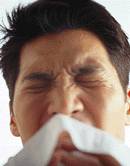 A service of the U.S. National Library of Medicine
A service of the U.S. National Library of Medicine  National Institutes of Health
National Institutes of Health

That May Not Be a Cold, Could Be Fall Allergies

TUESDAY, Sept. 25 (HealthDay News) -- Many parents complain that as soon as school starts, their child inevitably catches a cold. But, while kids do swap their fair share of germs during the school day, not every runny nose stems from a cold -- often, those sneezy symptoms are the result of fall allergies.
"When school starts, most parents think a runny nose has to be a cold, but a lot of times it's really hay fever caused by ragweed," said Dr. Joseph Leija, an allergist at Loyola University Health System's Gottlieb Memorial Hospital in Chicago. Leija also conducts the official pollen counts for the Midwest.
And, in the Midwest this year, he said, another allergen -- mold -- is an even bigger problem than it usually is. In fact, mold counts have been so high that air quality alerts have been issued. Normally, mold counts higher than 50,000 trigger air quality warnings, according to Leija. On Sept. 6 the count was 60,000.
Many areas of the country have been extremely dry this year, but that won't protect residents from mold allergies, Leija noted. It can rain heavily in one area and, even though it's very dry in surrounding regions, mold spores can travel with the wind.
Another concern: Allergy sufferers living in or near areas where corn is being harvested may be experiencing more allergies right now because corn is a member of the grass family, and grass allergies are common, according to Leija.
But, in most areas of the country, ragweed is the most common fall allergen. And ragweed often causes suffering until the first hard frost occurs, according to Dr. Blanka Kaplan, an allergist and immunologist with the North Shore-LIJ Health System in Great Neck, N.Y.
Why is ragweed such a problem? Well, just one plant can produce up to one billion pollen grains. And those grains are very light and travel easily. Depending on where you live, symptoms may start in early August and they can last through October, according to the American Academy of Allergy, Asthma and Immunology (AAAAI). Warmer temperatures and rising levels of carbon dioxide in the atmosphere may be extending the ragweed growing season, the AAAAI reports.
Symptoms of fall allergies are similar to those seen in the spring and may include sneezing, a runny nose, itchy or watery eyes, headache, sinus pain and pressure, and increased asthma symptoms, Leija said. The AAAAI noted that ragweed allergies can sometimes cause hives on the skin.
Leija said that, ideally, people with allergies should start taking their allergy medicines before symptoms begin. "If you wait until symptoms develop, it can take days for the medications to start to work," he said.
Kaplan said over-the-counter antihistamines, such as Allegra, Claritin and Zyrtec, are usually good at controlling allergy symptoms. Some people also benefit from the addition of a steroid nasal spray that helps shrink swollen nasal tissue, she said.
"If you try over-the-counter medications and they don't help, talk to your doctor, there are various options available," said Kaplan, noting that your primary-care doctor may refer you to an allergist to find out exactly what you're allergic to.
If medications don't give you relief, both experts said that allergy shots (immunotherapy) may be an option. Standard immunotherapy takes several months before it's effective, however. Leija said a newer type of immunotherapy called rush therapy involves getting five to 10 injections in a single day. With this type of therapy, you may get full immunity within two weeks, according to Leija. But, he added, not all insurance companies cover this therapy.
Both Leija and Kaplan recommend keeping windows closed, and filtering your indoor air with an air conditioner. (Be sure to keep the air conditioner filter clean.) Kaplan said it's a good idea to stay indoors if you can when the pollen counts are high. Leija suggested taking a shower when you come into your home, or before bed, to get the pollen out of your hair and off your skin.
And, both experts recommended taking allergy and asthma medications on a regular schedule.
If mold is an issue for you, Leija said to check your yard for any standing water because it will encourage mold growth. The same goes for decaying leaves in your yard or gutters. If possible, hire someone to remove the leaves for you. If you have to do it yourself, wear a mask while you're working. If you have mold inside your home, he said that a solution of bleach and water can kill mold spores.
SOURCES: Joseph Leija, M.D., allergist, Gottlieb Memorial Hospital, Loyola University Health System, Chicago; Blanka Kaplan, M.D., allergist/immunologist, North Shore-LIJ Health System, Great Neck, N.Y.
- More Health News on:
- Molds